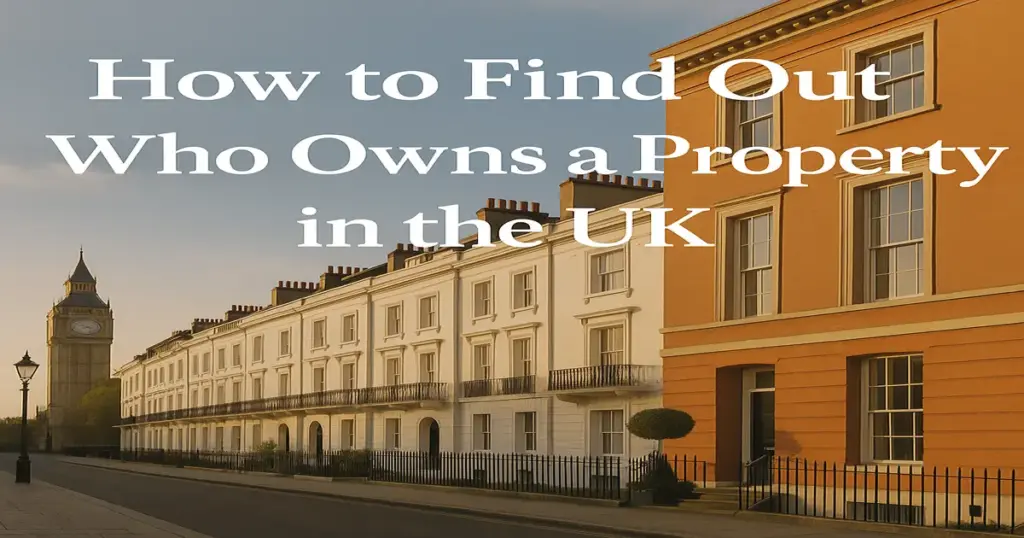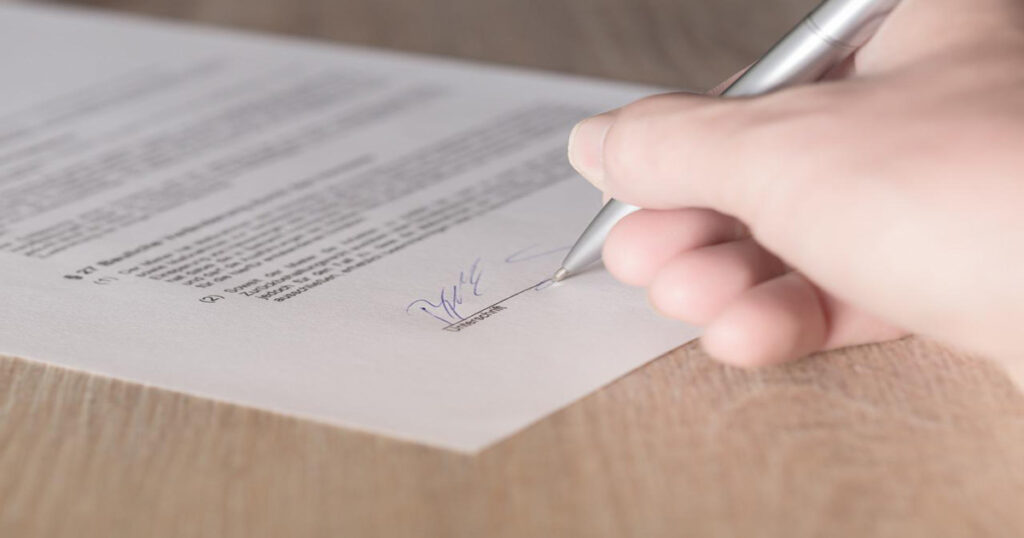How Do I Find Out Who the Owner of a Property Is in the UK?
Whether you’re a potential homebuyer, a neighbour with concerns, a property investor, or simply curious, finding out who owns a property in the UK is a fairly straightforward process — provided you know where to look.
Although the UK has a well-established system for recording land and property ownership, the process and tools vary slightly depending on whether the property is in England, Wales, Scotland, or Northern Ireland.
In this comprehensive guide, we’ll discuss the official routes, costs, and practical considerations for discovering who owns a property in the UK. We’ll also cover legal and ethical concerns, what to do if the property isn’t listed, and answer frequently asked questions at the end.
Why Would You Want to Know Who Owns a Property?
There are many legitimate reasons for wanting to know who owns a property, such as:
Considering buying or renting the property
Notifying the owner of damage or boundary issues
Reporting suspected abandonment or antisocial behaviour
Interested in land development or investment
Conducting academic or genealogical research
Resolving legal disputes or boundary clarifications
Knowing the owner can be essential, especially when formal communication is required or a transaction is being considered.
The Basics: Is Property Ownership Public Information?
Yes — in most cases. Property ownership in the UK is recorded and held by government-managed land registries. These records are accessible to the public (often for a small fee). However, access does not necessarily mean you’ll get every personal detail about the owner. Data protection laws limit how much personal information you can receive, especially regarding residential properties.
How to Find the Owner of a Property in England and Wales
Use the HM Land Registry
The HM Land Registry is England and Wales’s go-to source for ownership details. The service keeps records of most properties and land, including ownership details, mortgages, lease terms, and boundaries.
Step-by-Step Guide:
Visit: https://www.gov.uk/search-property-information-land-registry
Search by address or title number.
Purchase the title register (usually £3 per title).
Download and review the document, which will list the owner’s name and the address of the person (or company) who owns it.
You may also want to download the title plan (also £3), which shows the property’s boundaries.
What Information Will You Get:
Full name of the owner(s)
Address of the owner (sometimes different from the property itself)
Price paid (if available)
Date of purchase
Mortgage lender details (if mortgaged)
Type of ownership (freehold or leasehold)
Limitations:
Not every piece of land is registered (mainly if it’s never been sold since 1990).
Some information may be outdated if ownership changed recently.
You won’t receive telephone numbers, email addresses, or other private data.
How to Find the Owner of a Property in Scotland
In Scotland, property records are maintained by the Registers of Scotland (RoS).
Steps:
Enter the property address in the search bar.
If available, buy a Title Sheet for £3.
The Title Sheet provides similar information to what’s available in England and Wales, including the proprietor’s name and the property’s legal boundaries.
How to Find the Owner of a Property in Northern Ireland
Northern Ireland has its own body called the Land and Property Services (LPS).
Ownership details in Northern Ireland are less immediately accessible to the public than in other parts of the UK. To obtain ownership information:
Contact the Land and Property Services (LPS) Customer Information Centre.
You may need to submit a written request explaining your reason for seeking the information.
Fees and forms may vary depending on the specifics of your request.
For more information, visit: https://www.nidirect.gov.uk/articles/land-property-services-lps
What If the Property Is Not Registered?
Some older properties or parcels of land — especially those that have never changed hands since the 1980s or earlier — may not be registered.
If your HM Land Registry or RoS search comes up empty:
Ask the neighbours: Long-standing neighbours might know the owner or how to contact them.
Check local authority records: Planning departments or council tax offices may hold indirect ownership information.
Use a local solicitor: Some conveyancing solicitors specialise in locating owners of unregistered land.
A land charges search can sometimes reveal obligations tied to a person or property.
Eventually, if ownership cannot be determined, you may need to apply to possess the land (in extreme and prolonged situations — e.g. adverse possession, or “squatters’ rights”).
What About Commercial Properties?
If the property is a shop, office, or industrial site, ownership is still held by the relevant land registry. However, you may also try:
Companies House: Search by business name and see the registered office and director details.
Business Rates records: Local councils often publish lists of who pays business rates.
Local business directories or signage: Many commercial properties include the owner’s or management company’s details.
How to Find Out If a Property Is Owned by a Company or Trust
If the property is listed as being owned by a company, you can cross-reference the ownership name in the title register with:
https://www.gov.uk/get-information-about-a-company for company records.
You’ll see the registered office address and possibly the names of directors or beneficial owners.
For trusts, information is more difficult to access. Trusts usually list the trustee’s name (often a solicitor or corporate entity). You may not be able to identify individual beneficiaries without legal grounds.
Other Ways to Find a Property Owner
Knock on the Door
It sounds simple, but if the property is occupied, politely ask. Many owners are open to discussions about selling, renting, or neighbourly concerns.
Use a Tracing Agent
Private investigators or tracing agents specialise in finding people, especially owners of abandoned, inherited, or disputed properties. This can cost several hundred pounds but may be worth it in complex cases.
Look at Planning Applications
Local councils usually keep public records of planning applications. These documents often name the applicant (who may be the owner or acting on their behalf).
Search on your local authority’s planning portal with the property’s address.
How Much Does It Cost?
HM Land Registry title register: £3
Title plan: £3
Registers of Scotland title sheet: £3
Northern Ireland (LPS): Varies (usually £5–£25)
Professional help (e.g. solicitors or tracing agents) can cost significantly more, depending on the complexity and method used.
Legal and Ethical Considerations
Even though ownership information is publicly available, you should never misuse this data. It is illegal to:
Use the information for harassment or unsolicited marketing.
Share or publish personal information irresponsibly.
Trespass on private land in search of an owner.
Data protection laws in the UK (e.g., the GDPR) protect against improper use of personal data. Always approach property owners respectfully and lawfully.
Frequently Asked Questions (FAQs)
Can I find the owner’s phone number or email address?
No. Property registers do not contain private contact details. You’ll see the owner’s name and service address, which may or may not be the property itself.
How accurate is the information?
That is pretty accurate, especially if the property has changed hands recently. However, ownership changes may take weeks to update, and some information may be outdated if the property hasn’t been sold in decades.
What if multiple people own the property?
All registered owners will be listed on the title register. Ownership could be joint tenants or tenants in common, affecting inheritance and sale rights.
Can I find out who used to own a property?
Yes, but with limitations. The title register usually shows the last sale price and date. You can order historical copies from the HM Land Registry or ask for archived deeds for more historical ownership.
What if the owner is deceased?
If the property hasn’t yet been transferred to a new owner, it may still be listed under the deceased’s name. The executor of the estate or solicitor may be handling the transition. You can also search the Probate Registry to see who was granted probate.
Is there a free way to find this out?
While most official services charge a small fee, you can try:
Checking planning applications online
Asking neighbours
Visiting the property to see if contact details are posted
Can I contact the owner via the HM Land Registry?
No. HM Land Registry does not act as a middleman. You must contact the owner using the address listed on the title register.
How long does it take to get the information?
For online searches (e.g., through HM Land Registry), you’ll receive the document within minutes. Requests through LPS (Northern Ireland) or special cases may take several days.
Conclusion
Finding out who owns a property in the UK is easier than you might think, thanks to the publicly available land and property records. England, Wales, Scotland, and Northern Ireland each have slightly different processes, but all aim to maintain transparency and access for legitimate inquiries.
For just a few pounds and a few minutes online, you can usually uncover the property owner’s name and address. While legal and ethical limitations exist on how this data can be used, it remains an invaluable resource for resolving disputes, investing, and community involvement.
Always approach your search with respect and proper intent; you’ll likely find what you’re looking for.
England & Wales – HM Land Registry
Search property information:
https://www.gov.uk/search-property-information-land-registry
Use this service to determine who owns land or property in England or Wales.HM Land Registry homepage:
https://www.gov.uk/government/organisations/land-registryContact HM Land Registry:
https://www.gov.uk/guidance/contact-hm-land-registry
Scotland – Registers of Scotland
ScotLIS (Scotland’s Land Information Service):
https://scotlis.ros.gov.uk
This is the online service for checking property ownership in Scotland.
Read our top Blogs:
Sell My Property Fast For Cash In Wandsworth
What to Do If Your House Won’t Sell: Fast Solutions That Work
How to Sell a House Fast: Proven Tips to Get a Quick Sale Without Estate Agents
7 Legal Ways to Sell a Property with Problem Tenants in England or Wales
Call +447702210159 our friendly team for a same-day offer





